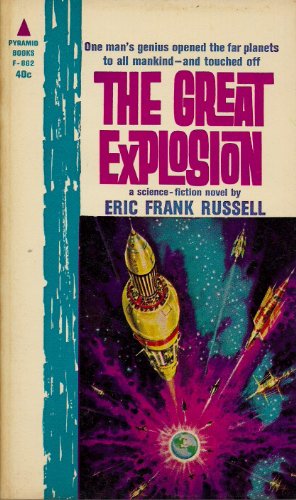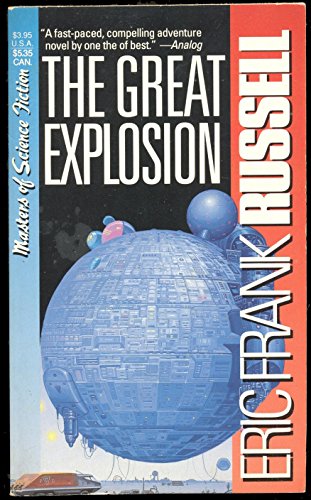
![]() The Great Explosion by Eric Frank Russell
The Great Explosion by Eric Frank Russell
In his 1955 collection entitled Men, Martians and Machines, English sci-fi author Eric Frank Russell told, via one short story and three novellas, some of the adventures of a starship crew that strongly suggested nothing less than a proto-Star Trek ensemble. The collection featured visits to three very different sorts of planets, in which the men, Martians, and robot of the starship Marathon came up against a world of mechanical devices; a world of green-skinned inhabitants, lethal trees and giant snakes; and a world of ropy creatures with the power to induce hypnotic hallucinations. Apparently, Russell liked the episodic nature of the collection, with its explorations of three discrete and very strange worlds, and thus used it again for his 1962 offering The Great Explosion. Initially released as a Torquil hardcover (the edition that I was fortunate enough to acquire), the novel was based on a short story of Russell’s called “And Then There Were None,” which had appeared in the 25-cent, June ’51 issue of John W. Campbell’s Astounding Science-Fiction magazine. The novel, Russell’s eighth out of an eventual 10, turns out to be a complete success, and no less a critic than David Pringle has gone so far as to call it “perhaps Russell’s best.” Both highly amusing and wildly imaginative, the book ultimately provides the reader with much in the way of food for thought, as well.
As for that interesting title, “the great explosion” does not refer to the original Big Bang, as might be expected, but rather to the sudden outburst of migration that followed mankind’s discovery of the first faster-than-light means of space travel, the Blieder drive, named after the eccentric tinkerer who had discovered it, Johannes Pretorius van der Camp Blieder. This discovery, the reader gathers from later evidence, takes place some 200 years from the present day, while the bulk of the book transpires another 400 years further on, when Terra decides to make contact with the oddball cultists, dissidents, faddists, and so on who had previously gone out to colonize some 1,600 worlds. Thus, we watch as the crew of the unnamed, mile-long starship — composed of around 2,000 crewmen, Army troops, bureaucrats and one Earth ambassador — sets out on its mission of contacting four of these worlds, and hopefully establishing consulates and military alliances. As it turns out, their mission is anything but simple.
 The first visited world was settled by former convicts and assorted criminals, whose descendants have apparently mellowed not a whit after four centuries. The second planet, Hygeia, was originally established by health faddists and nudists; a planet of bare-naked sun worshippers and germophobes who go far in embarrassing the starship crew. Planet 3 is never landed upon, as this world, Kassim, settled by a mixed sect of Buddhists and Muslims, appears to have been wiped out by a plague of sorts. On planet 4, dubbed officially K229, the crew encounters folks who don’t seem the least bit interested in the mile-long ship that has landed in their midst. (It is this final planetary visit that comprised the entire text of the original short story.) They are a people who live by three key tenets: MYOB (mind your own business); a moneyless economy that instead entails the transferring of “obs” (obligations) to one another; and the philosophy of passive resistance, borrowed from Gandhi, that basically boils down to saying “I won’t” (kind of like 27th century Bartleby the scriveners). This last philosophy, unfortunately, as it turns out, is one that proves quite irresistible and contagious to the spaceship’s crewmen, with the result that before long, ship captain Grayder and Army colonel Shelton find themselves dealing with nothing less than a full-blown mutiny and wholesale desertion…
The first visited world was settled by former convicts and assorted criminals, whose descendants have apparently mellowed not a whit after four centuries. The second planet, Hygeia, was originally established by health faddists and nudists; a planet of bare-naked sun worshippers and germophobes who go far in embarrassing the starship crew. Planet 3 is never landed upon, as this world, Kassim, settled by a mixed sect of Buddhists and Muslims, appears to have been wiped out by a plague of sorts. On planet 4, dubbed officially K229, the crew encounters folks who don’t seem the least bit interested in the mile-long ship that has landed in their midst. (It is this final planetary visit that comprised the entire text of the original short story.) They are a people who live by three key tenets: MYOB (mind your own business); a moneyless economy that instead entails the transferring of “obs” (obligations) to one another; and the philosophy of passive resistance, borrowed from Gandhi, that basically boils down to saying “I won’t” (kind of like 27th century Bartleby the scriveners). This last philosophy, unfortunately, as it turns out, is one that proves quite irresistible and contagious to the spaceship’s crewmen, with the result that before long, ship captain Grayder and Army colonel Shelton find themselves dealing with nothing less than a full-blown mutiny and wholesale desertion…
Eric Frank Russell was Campbell’s favorite author — an astonishing thing to ponder, when one considers all the remarkable talents who the editor gathered together to usher in science fiction’s so-called Golden Age — and one who Brian Aldiss would later call Campbell’s “licensed jester.” But anyone fortunate enough to lay hands on (the sadly long-out-of-print) The Great Explosion will soon heartily concur with that “licensed jester” statement. The book, to be succinct, is absolutely hilarious, and one that caused me to laugh out loud any number of times; not an easy feat. The book is written in Russell’s best slangy, jokey, lighthearted, tough-guy manner, and all the crew members we meet — and we do get to know a good number of them — are either pompous asses or wisecracking comics … all except Grayder himself, the only straight-arrow character to be found. As the dust jacket on that first edition tells us, the book is “peopled with as lovable a cast of characters as anyone could wish for, on Earth or off,” and I would most definitely agree with that statement!
 From the very first page, Russell’s amusing and appealing style is on display: “Johannes Etc. Blieder was a lunatic of the same order as Unk (who first made fire) [and] Wunk (who designed the wheel)…” It is difficult to explain how Russell achieves his comical effects, but trust me, they are there in abundance. Characters don’t simply walk in this novel; they “mooch” along. (After bumping into this word a good half dozen times in Russell’s book, I have decided that “mooch” is one of the funniest words in the English language!) When describing one of the wacky residents on planet 4, Col. Shelton opines, “The only thing missing was his bubble pipe!” (That one really cracked me up!) On planet 1, one of the tough-guy residents repeatedly calls our ambassador “Fatski,” forcing his excellency to comically shout “Stop calling me Fatski!” And what is the name of the trooper who has his trumpet stolen by one of the thieving occupants of planet 1? Wagstaff … the same name that Grouch Marx’s character had sported in the 1932 comedy classic Horse Feathers. To my happy surprise, The Great Explosion is easily one of the funniest sci-fi novels that I have ever read; on a par with Harry Harrison’s 1965 gem Bill, the Galactic Hero in the laughs department.
From the very first page, Russell’s amusing and appealing style is on display: “Johannes Etc. Blieder was a lunatic of the same order as Unk (who first made fire) [and] Wunk (who designed the wheel)…” It is difficult to explain how Russell achieves his comical effects, but trust me, they are there in abundance. Characters don’t simply walk in this novel; they “mooch” along. (After bumping into this word a good half dozen times in Russell’s book, I have decided that “mooch” is one of the funniest words in the English language!) When describing one of the wacky residents on planet 4, Col. Shelton opines, “The only thing missing was his bubble pipe!” (That one really cracked me up!) On planet 1, one of the tough-guy residents repeatedly calls our ambassador “Fatski,” forcing his excellency to comically shout “Stop calling me Fatski!” And what is the name of the trooper who has his trumpet stolen by one of the thieving occupants of planet 1? Wagstaff … the same name that Grouch Marx’s character had sported in the 1932 comedy classic Horse Feathers. To my happy surprise, The Great Explosion is easily one of the funniest sci-fi novels that I have ever read; on a par with Harry Harrison’s 1965 gem Bill, the Galactic Hero in the laughs department.
But as I mentioned earlier, Russell’s book isn’t merely an exercise in comedy, and does give the reader much to consider. The novel is often mordantly critical of the way the military operates, with its conflicting orders and buffoonish officers. And despite the ambassador’s disgust with the living arrangements on both Hygeia and K229, the reader soon senses that the health-worshipping nudists and the freedom-loving, self-styled “Gands” might be on to a better, more well-considered way of life than anything that Terra could possibly offer. No wonder so many hundreds of crewmen decide to desert the ship by the novel’s end! Given the choice between regulations and conformity, or complete liberty to follow your individual whims and eccentricities, what would you do? For most of us, I feel, the answer is a no-brainer.
Satirical, funny, fast moving and delightful, The Great Explosion, it seems to me, would make prime fodder for the big-screen treatment. Until such time as that happens, however, we have Russell’s wonderful original. This one comes more than highly recommended by yours truly. Read it now, and you can repay me the ob later…



That last planet sounds like something Ayn Rand might have invented if she’d had a sense of humor– except she couldn’t imagine a world without money.
It does sound fun. I have to say, and I’m being picky, that I have a hard time reconciling germophobes with nudists, but maybe they feel they have developed resistance to the germs in their native environment and don’t fear them.
Perhaps I should have clarified, Marion, that the sun-worshipping nudists of planet K229 were only afraid of the Earthmen’s germs, and that Russell shows them using hand sanitizers–actually, whole-body sanitizers–around 50 years before they became popular in reality….
Oops…I meant, the sun-worshipping nudists of HYGEIA!
Ah, that makes perfect sense and he was 100% accurate on that one!